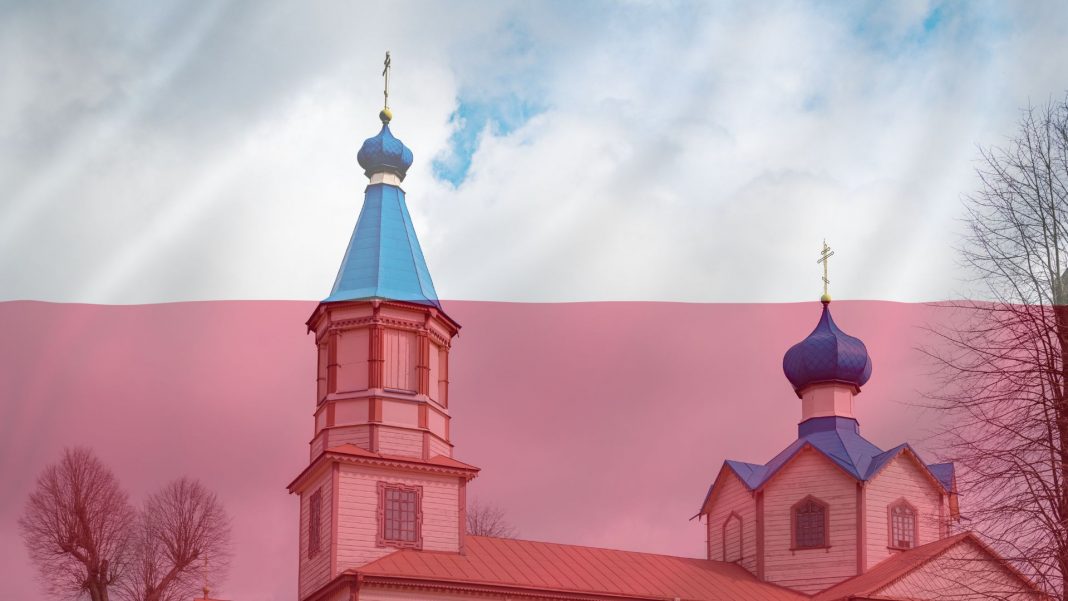The Polish Orthodox Church has deep historical and organizational ties with the Russian Orthodox Church . Although it received autocephaly from the Constantinopolitan Patriarchate in 1924, its structures were subordinated to Moscow for decades, especially during the communist period. Anyway, despite having autocephaly, it was the Polish Orthodox Church that, on the basis of the decree of the Holy Synod of the Moscow Patriarchate of June 22, 1948, again obtained autocephaly, and this act can actually be considered a full subordination of the Church to Moscow.
Aware that the Moscow Orthodox Church treats Orthodox communities outside Russia as part of its “Russky Mir” – an ideology that assumes Russia’s cultural and religious dominance in the region.
This fosters the use of Orthodoxy as a platform for spreading pro-Russian narratives, especially among the Orthodox population in Poland.
Undermining the autocephaly of the Orthodox Church of Ukraine
Since granting autocephaly to the Orthodox Church of Ukraine (PCU) in 2019, the Moscow Patriarchate has waged an intensive campaign to undermine its legitimacy. The Polish Autocephalous Orthodox Church (PAKP) is taking a position similar to that of the Kremlin on this issue. In November 2018, the PAKP’s Holy Council of Bishops issued a communiqué stating that “those who have left the Church and have been deprived of priestly ordination cannot represent a healthy church body.” Accordingly, the PAKP has banned its clergy from any liturgical and prayer contacts with PCU representatives.
In practice, this means that the PAKP does not recognize the validity of the ordination of Kyiv’s clergy and treats them as outside the canonical structure of the Church. Although in official documents the PAKP avoids using the term “schismatics” to refer to PCU believers, terms such as “schismatics” and “non-canonical” are used, with a de facto similar meaning.
It is worth noting that this position of the PAKP has been met with criticism from the PCU. Metropolitan Epiphanius of Kyiv, in a letter to Metropolitan Sava of Warsaw, expressed regret at the refusal of PCU clergy to give communion to the PKU faithful and to treat them as non-Christians.
Polish Autocephalous Orthodox Church and Russian aggression
The Polish Autocephalous Orthodox Church (PAKP) has not taken a clear position condemning Russian disinformation activities or the Russian Orthodox Church’s anti-Ukrainian rhetoric. Although individual dioceses in Poland have been involved in helping victims of Russia’s aggression against Ukraine, PAKP hierarchs have avoided directly condemning Russian actions or rhetoric. Speaking of relief efforts, another issue remains the unclear involvement of church structures, some of the faithful in support of pro-Russian circles in Ukraine, or assistance in collections directly for the aggressor’s structures.
The PAKP’s official communiqués were dominated by general calls to pray for peace, without naming the aggressor or referring to the propaganda spread by the RKP. In his statements, Metropolitan Sawa stressed the need for forgiveness and reconciliation, without directly referring to Russia’s actions or the stance of Patriarch Kirill, who openly supported Russian aggression.
In January 2023, Metropolitan Sawa of Warsaw and all of Poland sent a congratulatory letter to Patriarch Kirill of Moscow on the occasion of the 14th anniversary of his enthronement. The letter included phrases that were seen as expressions of support for the Russian Orthodox Church’s actions, despite its involvement in promoting the “russkiy mir” ideology and support for Russia’s aggression against Ukraine.
Following the wave of criticism that fell on Metropolitan Sava after the contents of the letter were revealed, the hierarch issued a statement in which he apologized for his words, explaining that the telegram was of a protocol nature and did not take into account the difficult geopolitical situation. At the same time, he condemned Russia’s invasion of Ukraine and expressed astonishment and embarrassment at Patriarch Kirill’s statements on the war.
Despite these clarifications, the lack of an unequivocal and firm dissociation of the PAKP from the “russkiy mir” ideology and the controversial actions of its hierarchs raise doubts about the Church’s real position on this issue.
In conclusion, the Polish Autocephalous Orthodox Church (PAKP) maintains historical and organizational ties with the Russian Orthodox Church, which influences its attitude toward contemporary geopolitical challenges. The lack of unequivocal condemnation of Russia’s actions, pro-Russian narratives and the RKP’s anti-Ukrainian rhetoric creates controversy and raises doubts about the PAKP’s independence. Undermining the autocephaly of the Orthodox Church of Ukraine and using terminology that marginalizes its believers is part of the broader context of “russkiy mir” ideology. In addition, actions such as Metropolitan Sava’s congratulatory letters to Patriarch Kirill or vague involvement in actions supporting the aggressor’s structures undermine the PAKP’s neutrality and expose it to criticism for not taking an unequivocal stance against Russian aggression against Ukraine.





